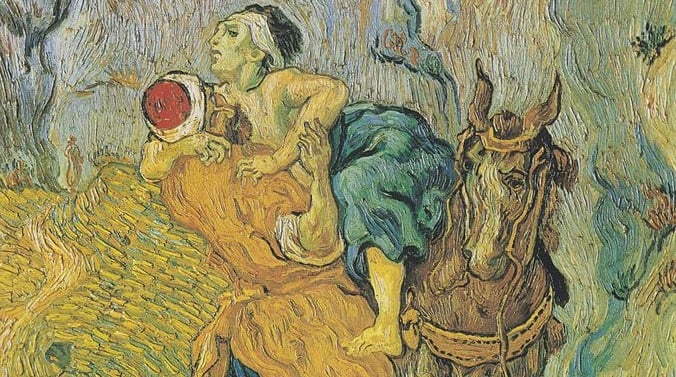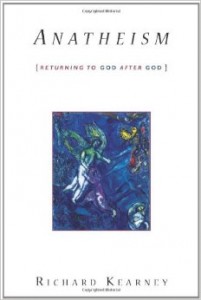
I confess that my post on the White House guest list was a failed experiment in reader response akin to what Colbert used to do on Comedy Central.
I wanted to see how many readers would find the title enough of a stumbling block to ignore the contents. Alternatively, I was curious how many readers would use their initial response to propel them into reading the post.
A lot of people got stuck on the wording of the title, rather than who it was addressed to. This was, to say the least, disappointing. Yet, it also was an auto-judgement the readers brought upon themselves in relation to those they might disagree with, epistemological strangers, if you will. It really rankles me how much some Catholics get bent into a pretzel over sexual ethics as if they were a sin bigger than greed (think of all the businessmen who get invited to such events!).
To continue in the confessional mode . . . The post was a setup for talking about Richard Kearney’s Anatheism: Returning to God After God. The author explains the title concept thus:
So how, in sum, does anatheism differ from atheism? This is a key question for the deliberations that follow. But let me offer this preliminary conjecture: anatheism differs from dogmatic atheism in that is resists absolutist positions against the divine, just as it differs from the absolutist position of dogmatic theism for the divine. It is a movement—not a state—that refuses all absolute talk about the absolute, negative or positive; for it acknowledges that the absolute can is never be understood absolutely by any single person or religion. Anatheism acknowledges the emancipatory force of critical atheism as an integral part of theism, understood as a second faith beyond faith. And it also respects agnostic atheism that remains just that–agnosis, not knowing–choosing not to make the second move of faith. What anatheism opposes is militant antitheism, which–as in the Reign of Terror or Stalinist persecutions–is just as pernicious as triumphant theism.

In other words, anatheism is the moment of decision for either a defensive or hospitable response toward the Stranger, the Wholly Other, who approaches us, whether human or Divine, although they are frequently intermixed. To illustrate that moment Kearney gives three examples from the life of Abraham where he is forced to respond freely to an oncoming Guest. First is his positive response of hospitality to strange three men (angels or robbers?) that is rewarded with a promise of fertility to aged Sarah. However, this extraordinary act of hospitality is then followed by rejection of the foreigner when Abraham drives out his foreign wife, Hagar, along with their child. These moments of unambiguous choice are then followed by the contradictions of Abraham having to discern what God wants him to do with Isaac. He first hears the call of bloody sacrifice and in fear and trembling attempts to follow it only to discover a different, more profound, rejection of human sacrifice (such sacrifice was not uncommon among ancient peoples).
According to Kearney, the last episode has a lot more in common with our daily experience of discernment:
Anatheism is a freedom of belief that precedes the choice between theism and atheism as much as it follows in its wake. The choice of faith is never taken once and for all. It needs to be repeated again and again–every time we speak in the name of God or ask God why he has abandoned us. Anatheism performs a drama of decision whenever humans encounter the stranger, who, like Rilke’s statue, whispers, “Change your life!” And every moment is a portal through which this stranger may enter.
This is the choice Abraham also faced when called out of Ur to be a stranger among strangers. Can you imagine the sorts of threat leaving home and continually being at the mercy of strangers might have posed to him? He had to discern the nature of this call and what it really demanded of him. This is how the journey of biblical faith began, both as a threat and as a promise from a stranger God who commanded Abraham to go out and expose his very life to the mercy of other strangers. It is very much the life through death of one’s expectations that I talked about in my post on shadow work and dying in the current contract economy.
By the way, the Vatican has pushed back against the guest list and it’s also been noted that the thing will be attended by thousands of other people. The initial reports made it sound like an intimate meeting. This is something Kearney discusses in Anatheism as well. He argues that unlimited hospitality is perhaps only practiced by God. We humans are finite and some people who might pose as guests might turn out to be threats to our lives or otherwise. Unfortunately, we need to make a discernment about the threat someone posing as a guest presents and act accordingly in order to protect ourselves, our neighbors, and guests who might arrive later. Fr. Jozef Tischner, the chaplain of solidarity and phenomenologist extraordinaire, called it the “unfortunate gift of freedom.”
In our increasingly liquid times it still remains that blessed is he who is not offended by the Stranger–even when it is an atheist, or from the other side, the believer. The stories of pure evil among believers from atheists and vice versa are getting about as boring as conspiracy theories about this White House. They only play into the worst human inclinations.
So where are we headin’? County road or Armageddon?
You might also be interested in looking at a collaborative video interview with Kearney on why he remains Catholic that was shot for Cosmos earlier this year.
As always, please consider donating via the Paypal button on my homepage even if I am a stranger to you. I’m in between jobs and we’re stuck going to foodbanks and asking for rent assistance. I pray we survive thanks to the kindness of strangers.












